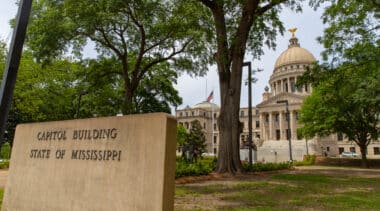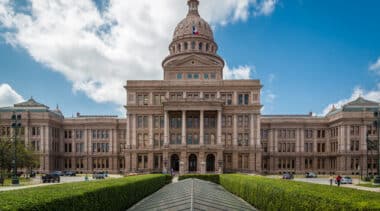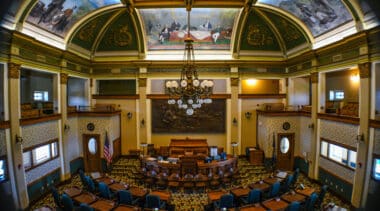Steven Gassenberger is a Policy Analyst with Reason Foundation's Pension Integrity Project.
Prior to joining Reason, Gassenberger worked as a consumer advocacy manager for Xerox Corporation specializing in financial consumer regulation and compliance. He also worked as a senior associate for Stateside Associates, where he developed state-level management strategies for a variety of policy areas. Prior to that, held positions at the National Breast Cancer Coalition and the International Fund for Agricultural Development.
At Reason, Gassenberger has contributed to in-depth analysis of the Arkansas TRS, Florida FRS, Louisiana LASERS, Louisiana TRSL, Mississippi PERS, Montana MPERS, Montana TRS, New Mexico ERB, New Mexico PERA, North Dakota PERS, Texas ERS, and Texas TRS pension systems.
Gassenberger has also presented testimony in Montana, Nebraska, and Texas during state pension reform efforts.
His work has been published in The Wall Street Journal and Business Observer.
Gassenberger recently shared the stage at the Pelican Institute’s Solutions Summit 2.0 with Louisiana State Senator Barrow Peacock, Michigan State Senator Phil Pavlov, and Jonathan Williams, Chief Economist at The American Legislative Exchange Council in discussing “Fostering a Sustainable System for Louisiana.”
Gassenberger graduated from the University of New Orleans with a BA in international relations and received a MA in public policy from Tel Aviv University.
-
Is private equity a public financial hazard?
Private equity funds lack clear return and risk metrics, making it hard to assess performance before investments are redeemed, often a decade or more after the initial investment.
-
Delaying Mississippi PERS reform will increase cost to taxpayers
PERS faces a $25.5 billion shortfall largely due to unfunded benefit increases, investment underperformance, and insufficient employer contributions.
-
Mississippi lawmakers can take the best from other successful state pension reforms
Texas, Arizona, North Dakota and Michigan are among the states passing reforms to reduce public pension costs and debt while keeping promises to public workers.
-
House Bill 2854 threatens Oklahoma’s pension progress
House Bill 2854 would re-expose Oklahoma to unnecessary unfunded liabilities, financial risks, and hidden costs that would ultimately be borne by taxpayers.
-
Pennsylvania’s proposed pension bills don’t meet best practices for cost-of-living adjustments
The result would be another level of unfunded liabilities that must be paid for by Pennsylvania taxpayers.
-
Texas Proposition 9 (2023): Amends the state constitution to provide a cost-of-living adjustment to teachers
Prop. 9 would increase benefits and long-term liabilities of the Texas Teacher Retirement System, which currently holds $63 billion in unfunded liabilities.
-
Texas legislature should prioritize open enrollment and TRS reform in special session
School choice and public school advocates should agree to let students attend any public school with open seats and address the Teacher Retirement System's $63 billion debt.
-
Texas legislature continues bipartisan push to modernize public retirement benefits
But the state’s most intractable public pension challenge—addressing the Teacher Retirement System’s $51 billion of debt and unsustainable fiscal path—remains.
-
Montana makes public pension progress but major opportunities remain
The major policies adopted this spring will help protect the state's public pensions.
-
“The Liability Trap” authors’ critique of pension fiduciary model misses the mark
Requiring a fiduciary responsible for public dollars to adhere to objective criteria and remain oriented towards achieving the pecuniary goals of the pension trust is the most basic policy.
-
Comments on Texas House Bill 3495 and Senate Bill 1246
TRS already holds $52 billion in pension debt so it is essential to examine the risks of the proposed investment class expansion.
-
Comments on Texas House Bill 3367 and Senate Bill 1245
The proposed bills would provide a modern, low-risk cash balance retirement plan for new judges while addressing the core issues causing today’s unfunded liabilities.
-
Montana’s default retirement benefit option should best serve most public workers
Montana House Bill 226 would better align the default retirement benefit option with what would best most workers need.
-
Proposed changes to Houston fire and police pension benefits require actuarial analysis
Texas lawmakers need to know and examine the long-term costs to taxpayers associated with HB 3340 before adding more benefit promises to an already underfunded retirement system.
-
Montana reform would improve pension funding and retirement savings for public employees
Montana House Bill 226 would adopt actuarially determined employer contributions funding to guarantee benefits are fully funded within a specified timeframe.
-
Comments on Montana House Bill 226 (2023)
The changes offered in HB226 would address how PERS is only optimal to a fraction of public employees at an ever-rising cost, and turn the system towards best practices in public retirement benefit design.


















